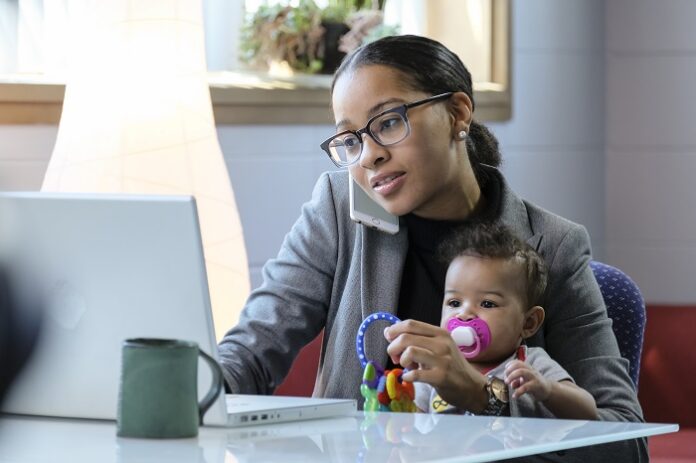Despite the inroads women have made into management positions in recent years, the majority of boards of directors are still dominated by men. Women comprise 28% of the boards of directors for S&P 500 companies and minority women make up just 10% of those seats. Since March 2020, nearly 1.8 million women have dropped out of the labor force and a survey of 1,508 women found that 69% expect to stay at home instead of returning to work. It’s an issue that Christine Tao, CEO and co-founder of Sounding Board, an AI-powered coaching and mentoring solution, will discuss during a panel titled “Improving the Women’s Leadership Pipeline” at the Women in HR Tech Summit next week at the HR Tech Conference in Las Vegas.
HRE spoke with Tao recently to discuss the pandemic’s impact on women who are balancing responsibilities at work and at home, how technology can help and why coaching has a role in advancing women leaders in the hybrid office. Here’s a lightly edited version of the conversation.
HRE: Women left the workforce in record numbers during the pandemic. How can HR leaders help them return to their former roles or to even better positions? Do we have to wait out the pandemic before work/life gets back to normal?
-

Christine Tao of Sounding Board
Tao: No. At Sounding Board, we put out a white paper entitled Beyond Burnout about the [pandemic’s] impact on women business leaders. The reason that we called it Beyond Burnout was [to emphasize] just how urgent the issue is, and behind that was a belief that there needs to be very intentional and immediate action on a systemic level to address [these issues]. Otherwise, there is going to be a longstanding impact on the number of women in the workforce.
All of the progress that we had made in the last 10 years has been negatively impacted. Deloitte put out a survey that said more than 53% of women were not only responsible for work but were also homeschooling their children. More than 50% of women said they were feeling overwhelmed or that they had to be constantly available. It shows the importance of the issue.
Related: How the pandemic is affecting women’s progress to pay equity
HRE: And Gen X female workers are often caring for elderly parents.
Tao: It’s like a sandwich, right? You’ve got children and older folks who were sick and then you have companies where there was [growth during] the pandemic. Some companies benefited greatly and went into scale-up mode, which still increases demands at work. Other companies were negatively impacted by the pandemic. Then you’ve also got the stress of keeping your job, staying employed and all of that. We know that there was a huge impact of the pandemic across the workforce but for women, it was a disproportionate impact.
HRE: How do we get them into their rightful roles?
 Tao: At Sounding Board, we have a solution that is aimed at scaling leadership coaching. I think of it as investing in upskilling managers and leaders to be more effective in the current environment.
Tao: At Sounding Board, we have a solution that is aimed at scaling leadership coaching. I think of it as investing in upskilling managers and leaders to be more effective in the current environment.
Companies themselves have to be intentional about bringing women back into the workforce. This means thinking about how you bring that intentionality into your recruiting and hiring, and then once you get them there, making sure that you have flexibility around your policies and how you allow people to come to work in a hybrid environment. [This includes] company policies to give them the ability to balance these different things that they’re juggling. Then, how do you help them further develop the skills that they need to be successful?
HRE: You mentioned upskilling and reskilling. What specific skills do you mean?
Tao: There’s a broad range. During the pandemic, you saw a huge increase in investment in the growth of companies that were offering health and wellness benefits. How do you address what we call individual needs around being able to make sure your nutrition, sleep, wellness, and mental and financial health are all taken care of? The second set is those skills that they will need to be more effective, functional and productive in the current environment. We talk a lot about adaptability, resilience and communication because [those are among] the most critical challenges in being able to keep people aligned in this work environment. These are what I call more functional or tactical skills, such as time management, prioritization and being able to adapt and juggle many things.
HRE: Can technology play a role?
Tao: Absolutely. Our mission is to help companies develop their most impactful leaders. My co-founder, Lori Mazen, and I wanted to see a model that would allow for investment earlier in people’s career paths to help them move up the leadership ladder, and technology has been a core part of that. We use it to deliver coaching virtually because companies are able to scale that more broadly. They’re able to offer it to leaders that they wouldn’t have been able to do before because the cost was prohibitive. The other simple part is just that we’re all at home. So, without technology, how else are you going to be able to access the learning opportunities? We’re seeing a lot of increases in digital experience that allow for connection to others in a remote environment as a way to develop and connect their employees.
HRE: How can employees network and grow their careers in a remote office? Can Zoom ever replace the office water cooler?
Tao: We have a fundamental belief that leaders have to be very intentional about the culture that they’re creating and how they generate and encourage these moments of interaction that maybe would have happened more naturally if they were in person. Now, you have to create the space for them and model that very visibly through your leaders. One thing we saw during the pandemic is that the investment in manager enablement increased because when you’re in your home now, you don’t have the physical location, the space and all of these other things that contributed to your employee experience. It becomes a smaller circle. It’s their team and specifically their manager that is now driving a large percentage of understanding and experience of the company.
Related: Bersin: These are the 2 disruptions reshaping coaching
This led to a lot of companies realizing that [they have] to get back to basics. Managers have to be much more skilled. They have had to be good managers [in the pandemic and] understand how to communicate, prioritize, adapt and empathize with their team because that is going to be the thing that keeps their employees engaged.





